Chile has been a wine-producing country since the first European settlers arrived in the mid-16th Century. The original vines, to make sacramental wine, were brought by Catholic missionaries directly from Spain or via Peru or California.
Its isolated location, hemmed in by the Pacific to the west, the Andes to the east, the world’s driest desert in the north, and Patagonia in the far south, presenting wine growers with a host of natural advantages. Chile famously remains one of the few places on the planet where phylloxera has yet to make serious inroads and Vitis vinifera vines continue to thrive on their own un-grafted rootstock.
“Historically, Chile has long been recognized as a place with great winemaking potential. Many of Europe’s prestigious winemaking families, such Chateau Mouton Rothschild and Chateau Lafite Rothschild opened wineries on the country’s soil. Other prestigious winemakers from other parts of the world such as Californian Winemaker Robert Mondavi and Catalan Winemaker, Miguel Torres did the same” explains CellarTracker
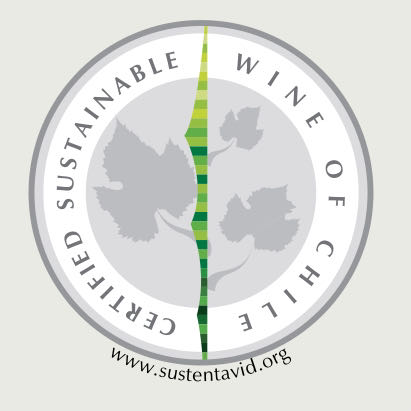
Chile has long embraced its responsibility to care for the environment. It’s elevated sense of agricultural “health-consciousness” can largely be attributed to one man: Claude Gay. In 1830, this French-born botanist, after carrying out some of the first investigations into Chilean flora, fauna, geology and geography, advocated in favor of creating a government agency to improve agriculture and protect the country from the perils of imported plant diseases.
Chile recognizes that sustainability goes beyond scientifically-sound sustainable farming. That is what they are emphasizing environmentally and socially responsible practices, while keeping economic feasibility in mind for long-term business success.
“Chile has been a global leader in sustainable development and is ambitiously contributing to the climate change agenda. Under the COP25 Presidency,…Chile will set out to achieve zero net emissions by 2050.”(source)
Disclosure: These wines were provided as media samples. No other compensation was involved. All opinions are mine.
Wines Tasted
2018 Emiliana Coyam Los Robles
Blend of 42% Syrah, 39% Carmenere with dollops of Cabernet Sauvignon, Garnacha, Malbec, Carignan, Tempranillo and Mourvedre. The name “Coyam” comes from a vineyard on granite-based soils in Colchaga’s coastal mountain range. All the fruit is own-rooted and is a massal (field) selection of different varieties, except for the Syrah, which is a specific clone.
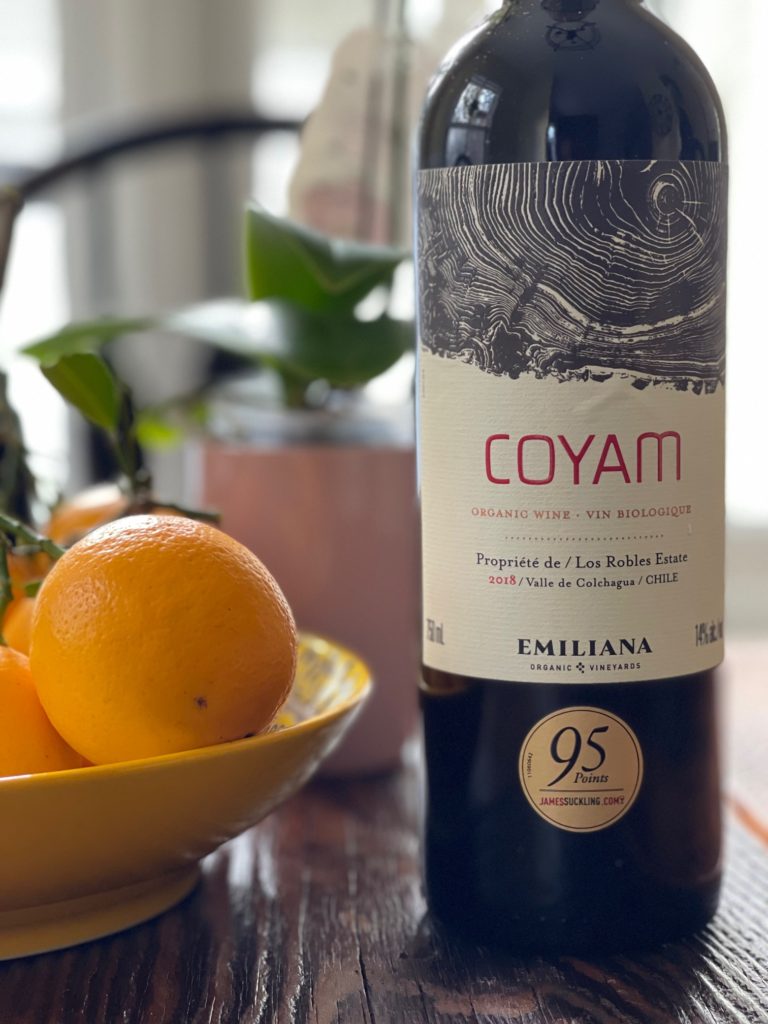
Nearly opaque red cherry color with black currant, black cherry, strawberry leather, pink peppercorns, vanilla, flint and a hint of mint aromas. On the palate, it’s medium-bodied with vibrant acidity and velvety tannins. It shows tart black currant, ripe black cherry, macerated blueberry, vanilla flavors with an appealing mix of dried herb and peppery savoriness. 14.4% abv| SRP – $35
A pioneer in Chile, Emiliana is one of the world’s largest producers of organic and biodynamic wines in the world. Their “8 Commitments To The Planet ” includes transparent and measurable environmental care, organic and biodynamic agriculture, social responsibility.
For example, Emiliana installs and supports organic gardens in local schools in 50% of the communities it operates in (goal; 100%). Additionally, it has 91 organic vegetable gardens for is employees, with many participating in collective growing to provide healthy food for their families.
2019 Viu Manent Malbec Secreto
This wine is a blend of 85% Malbec and 15% unidentified “secret” variety. Aged in 36% French oak barrels for 10 month and 64% in combination of stainless and concrete. This wine is part of their line of “Secreto” wines – a stated grape variety leavened with a “secret blend” (15%) of other grapes. The Malbec grapes come from vines that are around 20 years old.
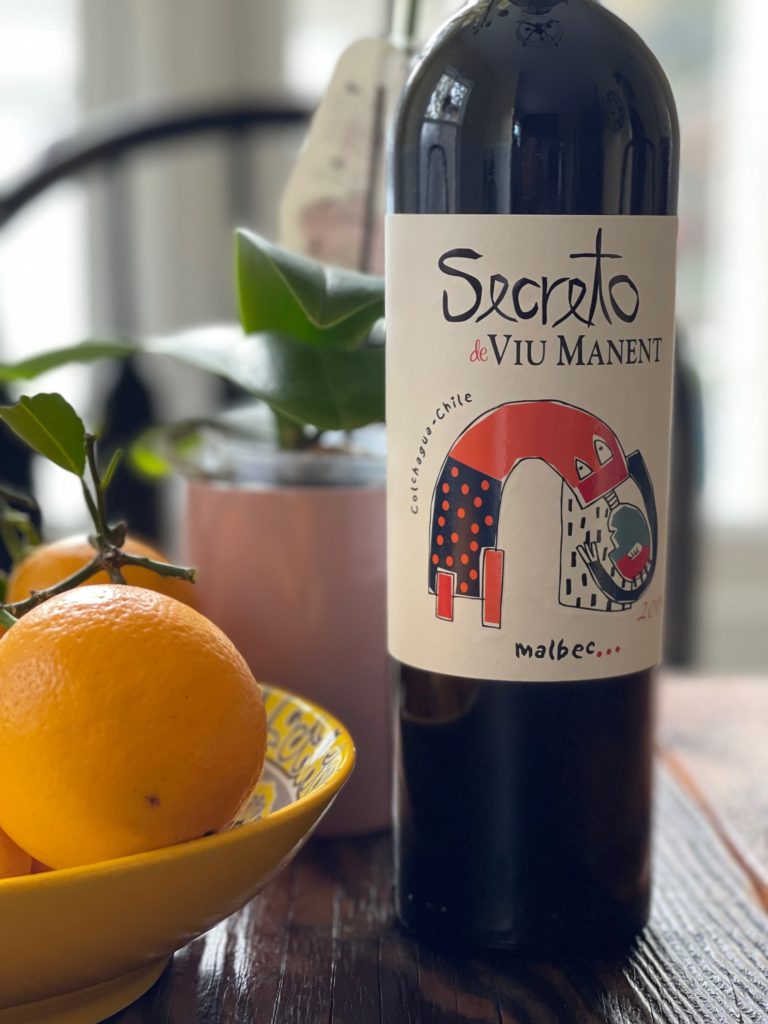
Opaque violet color with black currants, plum, black cherry liqueur, sage, white pepper and violets. On the palate it’s medium-bodied with good acidity and supple tannins. It shows tart black currant, black plum, ripe black cherry and savory spice flavors accented with earthy notes. 13.5% abv| SRP – $20
Family-owned since 1935, Colchagua Valley-based Viu Manent is one of the most respected wineries in Chile. Its corporate objectives on Sustainability, Quality, Food Safety, and the Environment, which are recognized as strategic pillars to ensure their commitment to community, customers, collaborators, and the sustainable development of our country.
For example, They have installed four solar plants that generate 460 kilowatts at peak, implemented biodiversity protection program as Central Chile is home to more than 50% of the various species of floral and vertebrates in the country, and recycling (such as using old barrels in promotions or by local artists)
2019 Viña Koyle Carménère Gran Reserva
Blend of 85% Carmenere/9% Tempranillo/6% Petit Verdot. Made from organically grown grapes. Vegan Aged 14 months in French oak.
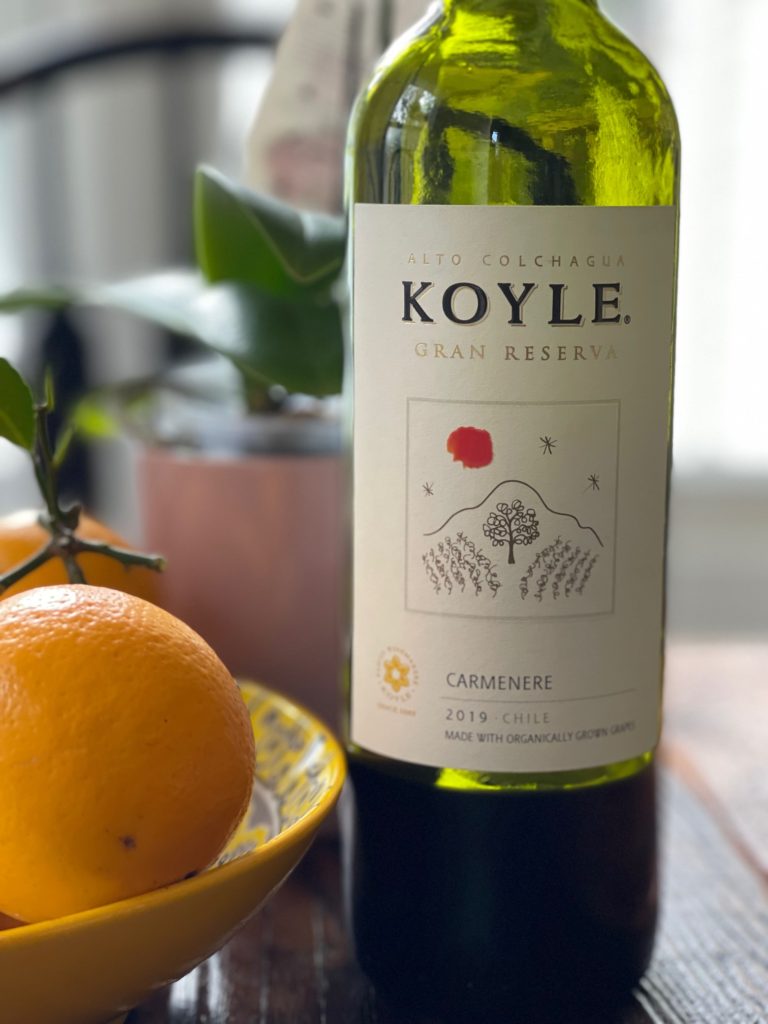
Translucent violet color with appealing red currant, red cherry, blackberry, tobacco, white pepper and a kiss of violet aromas. On the palate it’s medium-bodied with juicy acidity and fine-grained tannins It shows ample red currant, plum, blackberry, red cherry, white pepper and a hint of black tea flavors with a medium finish. 14% abv|SRP – $17
Viña Koyle’s (KOO-lay) biodynamic vineyards are planted on the rocky slopes of Los Lingues in Alto Colchagua and currently tended by the sixth generation of a family that has been making wine since 1885.
2019 Concha y Toro Cabernet Sauvignon Serie Riberas Gran Reserva Ribera del Tinguiririca
Fruit for this wine sourced from Palo Santo Vineyard, D.O. Marchigüe, Colchagua Valley, on banks of the Tinguiririca River. Blend of 94% Cabernet Sauvignon with about equal parts Carmenere and Syrah rounding out the blend. Aged 10 months in French oak barrels (21% new, 79% second use) and 5,000 lts. foudres.
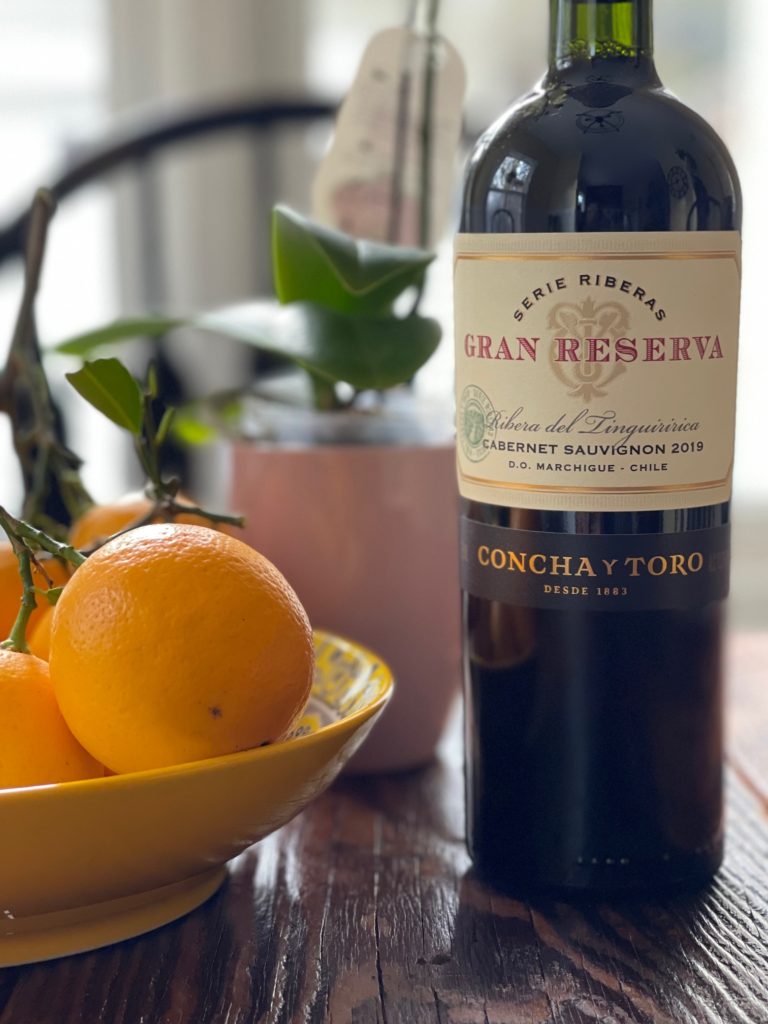
Opaque violet color with garnet lifted cassis, blackberry, cacao, dark roast coffee, cedar wood, vanilla and a kiss of mint aromas. On the palate, it’s medium-bodied and fresh with velvety tannins. It shows ample blackberry, black cherry, and vanilla flavors with a satisfying fruity finish. 13.5% abv|SRP – $17
In 2021 Concha y Toro received B Corporation Certification, which recognizes companies around the world that meet the highest standards of environmental management, governance and social performance.
B Corporation-certified with metrics including: 100% drip irrigation, 97% of waste reused/ recycled, 24% reduction of waste over 2018, 83% of energy comes from renewable sources.
Carbon Footprint has also been a focus for Concha y Toro, who have been working with international scientific organizations, to develop a detailed roadmap, which identifies costs and pegs them to reduction levels and targets. This methodology has been shared with Wines of Chile and in June 2021 several companies will sign a document in to commit to specific reductions – a first in the wine world.
2019 Viña Tarapacá Gran Reserva Organic Red Blend
Blend of 31% Cabernet Franc, 26% Syrah, 22% Carmenere, 11% Merlot, and 10% Cabernet Sauvignon. Organically grown grapes. Aged 12 months in 20% new French oak.
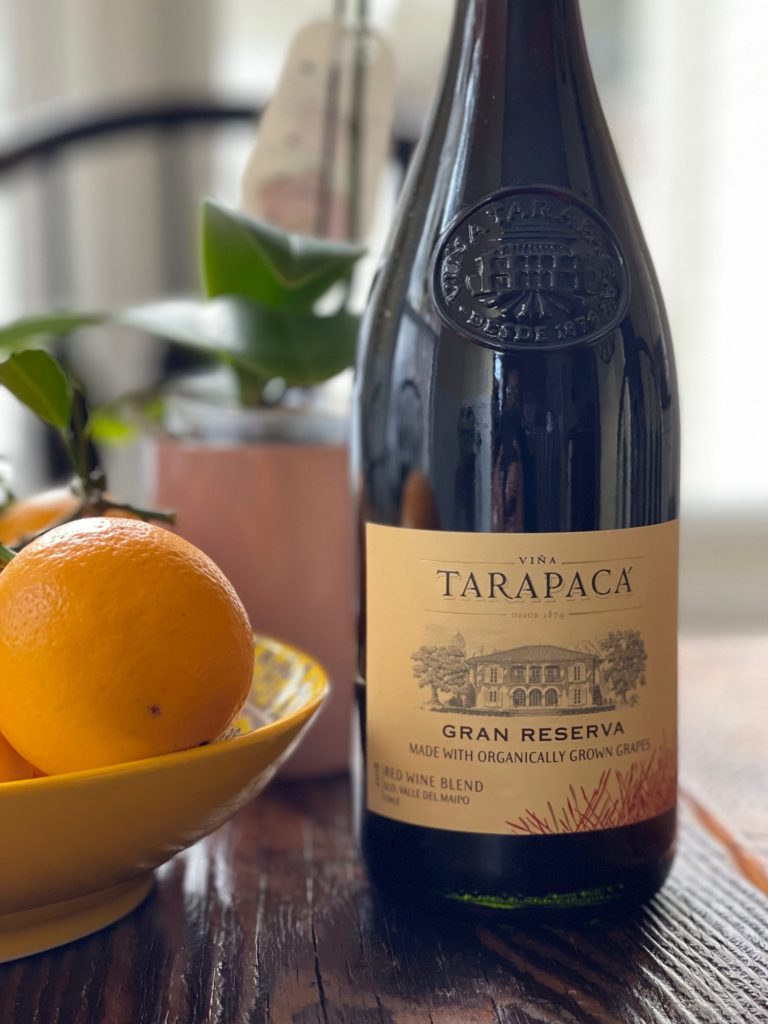
Nearly opaque deep ruby color with red and black fruit, violets, cacao, sun-baked earth and leather aromas. On the palate it’s medium-bodied with medium-acidity and ample plum, black currant, black cherry flavors accented with a savory spice undertone, and a very satisfying finish. 14% abv| SRP – $20.
Viña Tarapacá was founded in 1874 as Viña de Rojas. Years later it was acquired and renamed, but ultimately, as part of a divorce settlement, was renamed Viña Tarapacá. Its vineyards were established in Maipo valley in the the shadows of the Andes Mountain range and planted with grape varieties imported from France including, Cabernet Sauvignon, Merlot, Petit Verdot, Sauvignon Blanc and Semillon.
Dedicated to conserving and protecting its heritage Tarapacá has planted more than 11,000 native trees and shrubs restore the natural environmental balance and reconnect the biological corridors between the Altos de Cantillana mountains and the River Maipo through the estate’s 5,000 acres of vineyards. Additionally, they built a mini hydroelectric plant to create green renewal energy that powers 60% of the winery’s operations.
2018 Viña Maquis Cabernet Franc Gran Reserva
Blend of 90% Cabernet Franc/7% Carmenere/ 3% Petit Verdot. Aged 12 months in French oak.
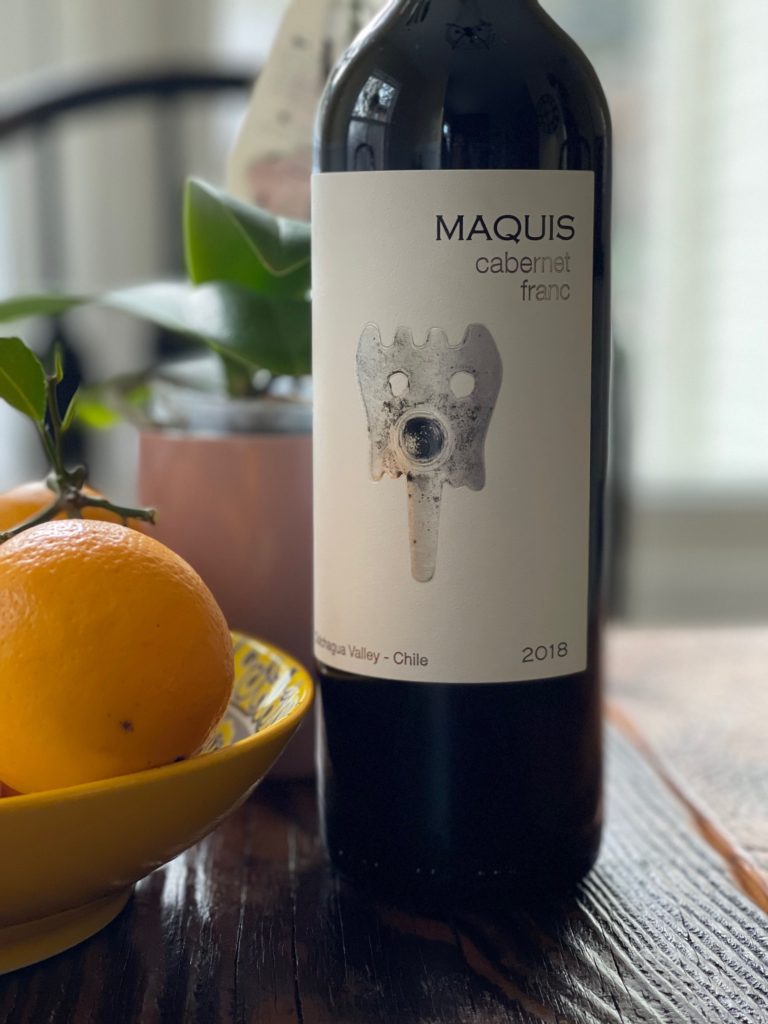
Deep translucent red color with inviting black cherry, plum, red currant, tobacco, and violet aromas. On the palate, it’s medium-bodied, and elegant with firm chalky tannins and vibrant acidity. It shows tart red currant, plum, black cherry flavors accented with a bit of damp earth and (classic for this Cab Franc) roasted bell pepper flavors that lend a very appealing tanginess to this wine. 14% abv| SRP – $24
Viña Maquis is one of the oldest wineries in the Colchagua Valley. Noble wine grapes have been grown on its property since the 18th century when it belonged to the Jesuit priests. In the 19th century it was owned by two Chilean presidents. It has been owned by the four generations of Hurtado family since 1916.
It is located in the heart of the Colchagua Valley between the Tinguiririca River and the Chimbarongo Creek, and these two waterways offer the benefits of a maritime influence. That along with the deep alluvial soil make for a unique terroir.
Viña Maquis was among the first wine producers in Chile to gain its Sustainability Certification. It reduced its electrical consumption by 30% and liquified gas requirements by 90% thanks to an energy recovery system using geothermal heat pump technology that was awarded the 2013 British Chilean Chamber of Commerce Innovation Prize.
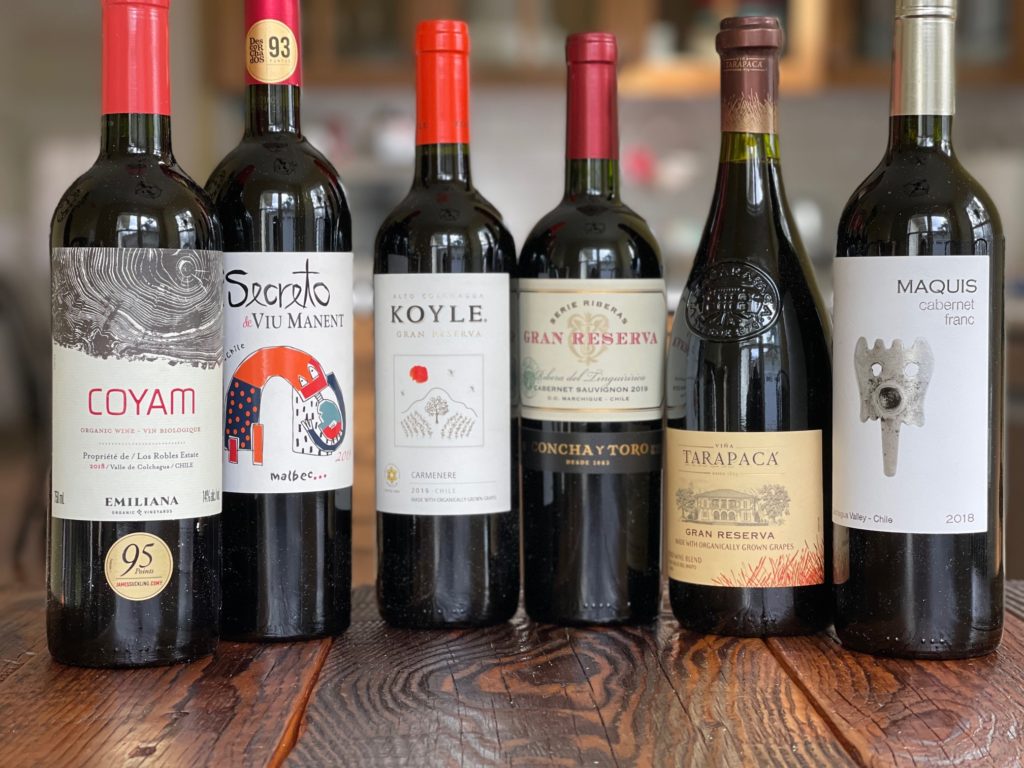
I recently posted a comment via social media about wanting to support wineries that practice sustainability and climate action. I received a comment from a reader that stated he “just wanted delicious wine and couldn’t care less about the ‘woke’ stuff.
I vehemently disagree. We are facing a climate crisis and if you’re not contributing to the solution, you’re contributing to the crisis. I choose to contribute to the solution, and one way I can do that is to support wineries who recognize it’s going to take more than sustainable farming for us to address the climate crisis and reduce carbon emissions to zero.
These are all very good to outstanding wines offering fantastic quality for the price. And the fact that they are produced using scientifically-sound sustainable farming that also supports environmentally and socially responsible practices, while keeping economic feasibility in long-term make these wine all the more appealing to me. These are all wines well worth seeking out!
Thanks to Creative Palate Communications and Wines of Chile for providing the samples and background information.
Our trip to Chile in 2019 really educated us firsthand on just how committed they are to sustainability (along with lifting the reputation of quality beyond the mass produced entry level wines). Some incredible gems there not to mention a beautiful region to visit!
Each producer deserves a bravo. We hit them all out last trip. Emiliana offers a super tour. Super informative Martin!
It’s amazing that you were able to hit all of these producers! Didn’t know you’ve been to Chile. I hope to go one of these days!